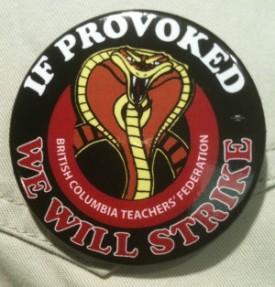GETTING MORE BANG FOR THE BUCK IN PUBLIC EDUCATION
If it weren’t for financial woes troubling our governments, we wouldn’t be getting so much pressure to reform public education. So, despite whatever personal hardship we personally experience in economic downturns, we should be thankful that these realities force people to see how efficiently or poorly public money is being spent.
Reasonable, practical people want hard data, not utopian or self-serving lobbies, to help guide decision-making for the 21st Century.
It was in 1977 that Nat Hentoff wrote about the US public education system in this story in Social Policy — THE GREATEST CONSUMER FRAUD OF ALL That was an era of Back to the Basics.
It was in the 1980’s that New Zealand did an audit of education spending and found that 2/3 of the education dollar never reached the classroom. They abolished regional school boards and devolved decision-making to school-based management at each school — accountable through their charters (contracts) to central government.
Economies have their ups and downs and we are again into tough times.
The education establishment — all the way from teacher training in universities to teacher unions to early childhood lobbyists — is now under the spotlight by governments and researchers.
The big question is: How can we get a better bang for the buck in education spending?
Obviously, the establishment, the BLOB (Bloated Learning Organized Bureaucracy), is doing it’s best to denounce reform efforts. Here are the unceasing complaints — social justice and equity will be compromised, poverty is the problem, we are underfunded, etc., etc., etc. Add such labeling as neo-liberalism, privatization, deprofessionalization, and you’ve got the playbook of the educator body.
Utah research findings by Martineau on the positive effect charter competition has on nearby public school performance is a great piece of good news. Competition and choice can actually have a positive effect on other schools in the pool. A rising tide lifts all boats!
See — Nearby charter schools boost public school performance, researcher says http://www.deseretnews.com/article/865575865/Nearby-charter-schools-boost-public-school-performance-researcher-says.html
These charters and other reforms such as Parent Trigger and tuition tax credits for private schools are legislature responses to parents who embrace the UN Declaration of Human Rights Declaration regarding parents right of choice in education.
The “audit culture” so attacked by those of the BLOB mentality is, unfortunately for the BLOB, the way decisions are informed today.
Regrettably, the resistance is still strong; the opposition is well-organized and well-oiled. If there are good models that need adoption, such as the Utah charters or the New Zealand model, they are vigorously attacked. The tall poppy — the New Zealand high achievement country — because its management model includes a majority of parents on their individual school boards, must be chopped down. Teacher unions and principals associations don’t like this model.
Here is speech just given to New Zealand principals by the Labour Party spokesman, Chris Hiskins. They are the opposition party and against competitive models of delivery. Leading the charge against this 25 year successful model is massive “research” by Cathie Wylie which pushes for replacement of parent involvement by professional collaboration, professionals who know what’s best. You know the spiel. http://chrishipkins.org.nz/?p=1036
CONCLUSION
As a parent involvement advocate for the last 40 years I do not see any sizeable improvement for meaningful involvement coming from the organized public systems. Therefore, as consumers and biologically-duty-bound humans, parents must stay determined to seek options, which circumvent and exit when an established system becomes oppressive and harmful.
Legislators, using audit principles, are seeing the economic benefits of providing for choices for parents. They also recognize the human folly of usurping parental involvement in nature’s most imperative duty — education of the young.
Freedom is a value unto itself. But in education, freedom it is a precious tool for truth-seeking. Parents, regardless of any errors they may make, or regardless of poorer academic results that may pertain, will, in the aggregate, yield well-educated, functional citizens. Citizens who respect freedom.
Home education is an excellent strategy but not practical for many parents. Thus, the choice movement advocating for vouchers, charters, tuition-tax credits, etc. should be supported,
